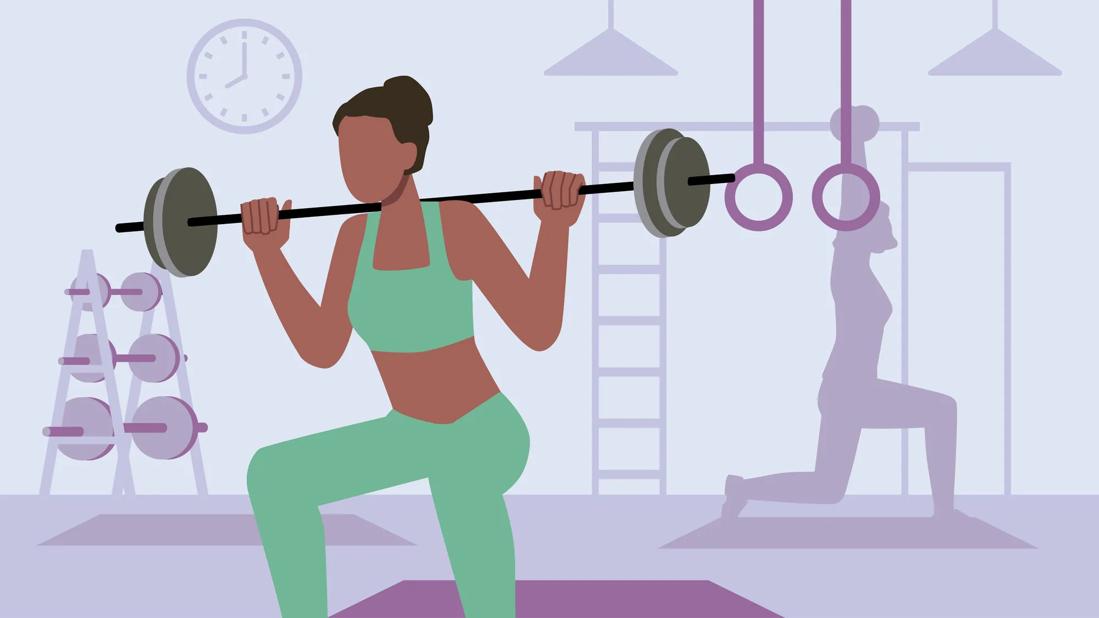Factors like temperature, energy levels and sleep quality play a role in determining whether working out in the morning or evening is best for you

If you’re committed to exercising regularly, you may be wondering when the best time is to do it. Right after you wake up? At the end of the day? Or should it be a mix of both?
Advertisement
Cleveland Clinic is a non-profit academic medical center. Advertising on our site helps support our mission. We do not endorse non-Cleveland Clinic products or services. Policy
Depending on your exercise goals, there may be specific benefits to working out at a particular time of day. “But for most of us who want to exercise for general health effects, the best time is the time that works best for your lifestyle and allows you to perform it regularly,” says cardiologist Erik Van Iterson, PhD.
The American Heart Association recommends a minimum of 150 minutes of moderate-intensity exercise or 75 minutes of vigorous-intensity aerobic exercise a week in divided sessions. Adding resistance training three times a week can further benefit you.
Dr. Van Iterson explains how to find your best workout time — and some key differences between exercising in the morning and evening.
Many variables contribute to a successful exercise program, including time of day, location, type of activity and social setting. But consistency is the most important variable and is most strongly linked to achieving the best results. It’s also important to think about the short and long term, as choosing a particular time of day when first starting out may not be the most pragmatic for you longer term.
In short, Dr. Van Iterson says that the best time to exercise is when you have the most energy and motivation to do it. “Regardless of why you exercise, pick the time that works best for you and stick with it,” he recommends.
Advertisement
But if you’re still unsure about what works best for you, here are some factors to consider.
If you're a morning person, then a morning workout is likely best, as there’s a greater chance you’re going to be able to build it into your schedule. But it’s good to consider all factors around exercising in the morning and how it’s different from evening workouts.
Dr. Van Iterson points out that exercising in the morning may be associated with lower blood pressure, better sleep and greater weight loss, due to improved fat burning and appetite suppression.
Some pros of working out in the morning include:
Some cons of working out in the morning include:
If you’re a night owl, exercising later in the day may be a perfect way to unwind and release stress. “For most of us, it is probably best to avoid exercising just before bedtime, since it may interfere with your ability to go to sleep,” Dr. Van Iterson poses. Instead, try and plan your workouts to be at least a full hour before you go to bed.
Advertisement
This mainly applies to vigorous workouts — a calm evening yoga session is A-OK, or a leisurely walk around your neighborhood shouldn’t be a problem.
On the other hand, afternoon or evening exercise is associated with peaks in body temperature and flexibility and appears to be better at improving aerobic performance and strength.
Some pros of working out in the evening include:
Some cons of an evening workout include:
Advertisement
Deciding to create a workout routine already means you’re on the right track. Ultimately, whether you decide to exercise in the evening or morning comes down to your personal preferences, daily schedules and how your body responds to exercise.
Here are some more considerations when deciding:
Advertisement
As Dr. Van Iterson points out, the most important thing is to find a consistent exercise routine that fits your lifestyle and helps you to achieve your personal fitness goals. How can you stay the most consistent? Just don’t let the indecision of when you should work out bog you down. Allow yourself to experiment and try out different routines.
If you’re still unsure, consider consulting a fitness professional or personal trainer. They can provide personalized guidance based on your goals, fitness level and lifestyle.

Sign up for our Health Essentials emails for expert guidance on nutrition, fitness, sleep, skin care and more.
Learn more about our editorial process.
Advertisement

Squats are foundational for building strength in your legs, glutes, quads and core muscles

A consistent walking program is an effective way to drop pounds and lose body fat

You can improve your athletic performance over time by breaking up your workout regimen into focused cycles

Lower-intensity workouts can deliver high-quality health and fitness results

Incremental changes in your exercise routine can improve your strength and endurance over time

Understanding heart rate zones can help you tailor your workout to reach your goals

Increase the size of your muscles by bulking up on protein and focusing on slow, intense movements with progressive overloading

Low-impact exercises help you recover faster between sets, during cool downs and on rest days

Even small moments of time outdoors can help reduce stress, boost mood and restore a sense of calm

A correct prescription helps your eyes see clearly — but as natural changes occur, you may need stronger or different eyeglasses

Both are medical emergencies, but they are very distinct events with different causes